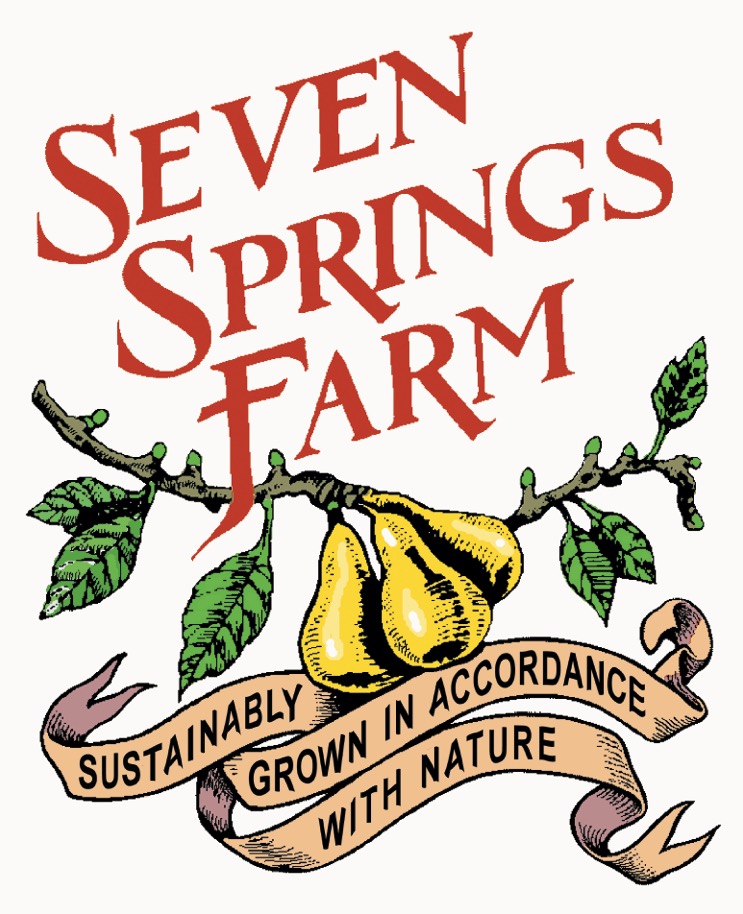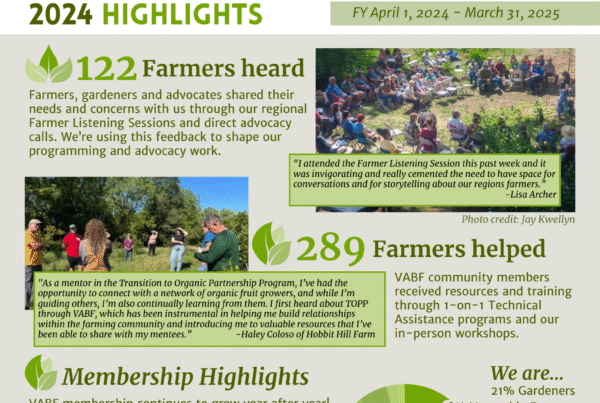VABF Policy Team Meets with Representative Spanberger
During the two week long Congressional Easter Recess, the VABF Policy Team had an opportunity to meet with newly elected Representative Abigail Spanberger and her staff to discuss agricultural policy. Rep. Spanberger is serving as Chair of the Conservation and Forestry Subcommittee of the House Agriculture Committee.
On April 15, VABF policy volunteers Patricia Stansbury and Jill Auburn met in person with the Representative and her district staff person Karen Mask, while her DC Legislative Director for agricultural issues, Bonnie Krenz, and I (Mark) participated by speaker phone. We had an excellent meeting, and discussed a wide range of topics from sustainable livestock production and rotational grazing, agriculture and climate change, and conservation technical assistance funding to urban agriculture and new and emerging small scale agriculture enterprises in and around the Richmond area.
Rep. Spanberger and her staff asked us for farmer stories on how Conservation and other Farm Bill programs have benefited Virginia producers. If you have a story about using NRCS conservation programs or technical assistance on your farm, please share it with me (schonbeckmark@gmail.com) or Patricia (epicgardens@gmail.com) so we can forward it to the Representative and her staff.
Patricia gave Rep. Spanberger a copy of the Organic Farming Research Foundation’s new Soil Health and Organic Farming Guide on Carbon Sequestration, Climate Mitigation and Adaptation (available at https://ofrf.org), and she eagerly stated her intent to read it at her earliest opportunity. She also expressed concerns about farms going out of business including at least one dairy in her district, and the need to re-integrate farming into our region’s wider cultural consciousness. During her election campaign, she met with VABF farmer members Dan Gagnon and Janet Aardema of Broadfork Farm in Chseterfield, and participated in a Culpeper County Farm Tour.
Patricia described her years of experience as a market gardener, her participation with Virginia State University in a SARE grant on edamame soybean production and cultivar evaluation, and her recent work with the Alliance of Native Seed Keepers. I outlined my role as policy liaison between VABF and National Sustainable Agriculture Coalition, and my work with OFRF reviewing USDA funded organic research and developing the Soil Health Guides. My comments on pasture based livestock as a key sustainable practice led to a wider discussion of silvopasture, rotational grazing, forest farming, and the USDA’s National Agroforestry Center as a “small but mighty” agency.
It is inspiring to have a Representative from Virginia leading the Conservation and Forestry Subcommittee who has such a depth of knowledge of the issues and such a strong commitment to advancing a sustainable agricultural system that builds rural and urban community wellbeing as well as conserving resources, rebuilding soils, and protecting the climate. We look forward to working closely with Rep. Spanberger and her staff over the coming years.
NRCS offers Advance Payment Option for Certain EQIP Participants
The Natural Resources Conservation Service is giving beginning, veteran, and socially disadvantaged farmers and ranchers a hand-up for participation in the Environmental Quality Incentives Program (EQIP). If you have farmed for less than 10 years, if you are a military veteran returning to farming or ranching, or if you are a farmer of color or other minority, you can receive a 50% advance payment on cost-share practices implemented under your EQIP contract. Having half the EQIP contract funds up front can certainly make it easier to implement a cost shared practice on a limited budget. Contact your district NRCS office for more information.
Administration Still Pushing Ill-Considered NIFA and ERS Relocation
Despite widespread and deep concern throughout the research and agricultural professional communities, USDA Secretary Sonny Perdue is pushing ahead with plans to relocate the National Institute for Food and Agriculture (NIFA) and Economic Research Service (ERS). At the beginning of May, USDA announced a “short list” of potential locations, including the Kansas City area, Indiana, and the Research Triangle area of North Carolina – all far enough from the greater DC area to force NIFA and ERS employees to choose between uprooting their families and selling their homes … or giving up their agency careers. The resulting disruption would cause a tremendous loss of skilled and experienced staff and thereby undermine agency capacity to carry out their missions. Already, the impending relocation and the general lack of Administration support for USDA research programs and agencies have impelled many personnel to leave NIFA and ERS, and either seek other employment or (often reluctantly) accept early retirement.
However, others are pushing back. On May 9, ERS employees voted overwhelmingly (138 – 4) to unionize, and to seek representation through the American Federation of Government Employees (AFGE). This will give ERS staff more leverage to put the brakes on a hasty process. NIFA employees plan to vote on June 11 on the unionization option. Meanwhile, in Congress, Representative Chellie Pingree and 16 co-sponsors have reintroduced the Agriculture Research Integrity Act (ARIA) as HR 1221. ARIA would block the move and also keep ERS within the Research mission area, thus maintaining the non-partisan and impartial nature of its work. Rep. Pingree is now circulating a Dear Colleague letter to garner wider, bipartisan support in the House of Representatives.
Take Action:
Contact your Representative and ask him or her to sign this Dear Colleague letter in support of HR 1221, the Agriculture Research Integrity Act.
For more on this development, visit http://sustainableagriculture.net/blog/release-administration-continues-to-strong-arm-relocation-of-core-research-agencies%ef%bb%bf/. Also see https://www.agri-pulse.com/articles/12184-ers-employees-vote-overwhelmingly-to-unionize.
Virginia Tech Senior Tyneshia Griffin Receives Cynthia Hayes Scholarship
Recently, the National Sustainable Agriculture Coalition (NSAC), Minorities in Agriculture, Natural Resources, and Related Sciences (MANRRS), and Southeastern African American Farmers’ Organic Network (SAAFON) awarded Cynthia Hayes Memorial Scholarships ($1000 each) to three outstanding young leaders to continue their work on issues that affect African American farmers. The late Cynthia Hayes was the founding director of SAAFON.
Virginia Tech graduating senior Tyneshia Griffin was one of the awardees. She has majored in geology and sociology, and plans to use her scholarship to help establish connections with other agricultural professionals focused on racial equity and social change within the wider context of sustainable agriculture and environmental stewardship. After graduating, she plans to begin a policy internship with NSAC.
The other two awardees are Vanessa Garcia Polanco and Najma Muhammed, both of Michigan State University. For the full story, visit http://sustainableagriculture.net/blog/releasecynthia-hayes-scholarship-2019/.
Fiscal Year 2020 Budget and Annual Appropriations Process
Congress has begun work on the Budget and annual appropriations for Fiscal Year 2020. This process will set spending levels on discretionary programs such as Sustainable Agriculture Research and Education (SARE, whose funding has increased significantly in recent years) and the Rural Microentrepreneur Assistance Program (RMAP). The appropriations bill can also provide additional funding for the Local Agriculture Markets Program (LAMP) and the Farming Opportunities Training and Outreach (FOTO) program.
Funding levels need to be set by the end of September of this year to avoid delay in the 2020 programs. The House Appropriations Committee and its subcommittees are moving ahead with this work. However, the process is moving more slowly in the Senate, and there also remains another major hurdle to clear. In 2011, the Budget Control Act enforced severe limits on annual appropriations as well as mandatory spending through 2021. A budget deal was negotiated for FY 2018 and 2019 that raised the cap and allowed increased appropriations (this is a major factor in the funding increases won for SARE); however a whole new budget agreement is needed for 2020 and 2021 in order to avoid severe cutbacks in this and many other vital programs.
The President has stated his opposition to raising 2020-21 appropriations beyond the limits set in 2011, and Republican Members of Congress may hesitate to oppose him on budget issues. So we may need a big advocacy push to keep SARE and other sustainable agriculture discretionary programs adequately funded. Stay tuned! For more information, visit http://sustainableagriculture.net/blog/fy-2020-budget-update/.
$41 Million for Gus Schumacher Nutrition Incentive Program
The USDA recently released the Request for Applications for the Gus Schumacher Nutrition Incentives Program (formerly the Food Insecurity Nutrition Incentive, now expanded and given permanent mandatory funding by the 2018 Farm bill). A total of $41 million are available to support three types of projects:
- SNAP Incentives – use of SNAP benefits for local fresh produce at farmers’ markets, CSAs, and local groceries.
- Produce Prescription Programs – fresh produce to help low-income families prevent or treat diet-related health conditions.
- Training, Technical Assistance, Evaluation and Information Centers
Application deadline is June 10. For more information, including link to the full RFA, visit http://sustainableagriculture.net/blog/41million-fy2019-gusnip-food-access/.
NRCS Offers Funding for On-farm Conservation Trials
Julie Hawkins at NRCS Virginia State office just issued this exciting announcement:
The 2018 Farm Bill authorized a new, additional sub-program for CIG (Conservation Innovation Grants) referred to as On-Farm Conservation Trials. The signup for this new opportunity opens today for up to 25 Million for On-Farm Trials and is posted on Grants.gov. NRCS is accepting proposals from private entities whose primary business is related to agriculture, Non-governmental organizations with experience working with agricultural producers, and Non-Federal government agencies through July 15, 2019. The minimum award is $250,000 with a maximum of $5,000,000.
The funding announcement is available at the new CIG On-Farm Conservation Innovation Trials website (hyperlinked).
The official news release provides additional information including a webinar for applicants.
By Mark Schonbeck






